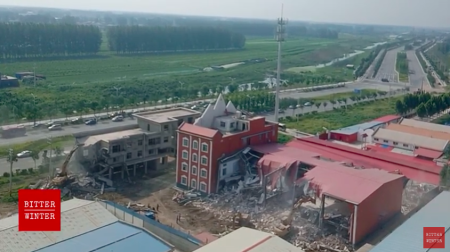China: Authorities forcibly demolish 'illegal' church; elderly congregants injured

Communist officials demolished a church in China's Henan province for engaging in “illegal fundraising” after forcibly removing congregants, injuring two elderly people in the process.
According to Chinese persecution watchdog Bitter Winter, True Jesus Church was razed to the ground completely. A new lawn with saplings was planted in place of the church, bearing no trace of its existence.
The persecution began on June 22 when about 60 officials with the Religious Affairs Bureau stormed True Jesus Church, located in Caidu town of Shangcai county, under the jurisdiction of Zhumadian city in the central province of Henan.
Authorities reportedly cut off the church’s electrical supply before climbing over the courtyard wall to break the gate lock and entering the building where about 200 believers were meeting.
Alleging the church was engaged in “illegal fundraising” and was, thus, an “illegal building,” the director of the Religious Affairs Bureau, who was in charge of the raid, ordered the person in charge to vacate the church. He informed congregants the church would be converted into a nursing home. However, the congregation refused to comply.
Over the following weeks, police continued to harass the church, frequently surveilling and recording services at the church from its entrance.
Just over a month later, nearly 1,000 personnel from several county departments gathered at a nearby school, getting ready for an operation to forcibly demolish the church. Police officers were reportedly ordered to drag out all believers from the church, no matter how many would be present.
As soon as all orders were given, the group of 1,000 people went to the church and cordoned off all intersections leading to the building. Officers stormed inside and began dragging out congregants who were guarding the church. Two elderly believers were injured; one was taken to the hospital because her blood pressure spiked from the stress.
After thoroughly searching the church, the police took away a piano and four air-conditioning units. Then, eight excavators began demolishing the church, worth about 10 million RMB (about $1,400,000).
Authorities continued to persecute church members even after the church was demolished. In August, eight persons in charge of the church and 13 churchgoers were charged with committing “unlawful detention” of the director and were arrested.
A church co-worker compared the incident to the events during the 1989 Tiananmen Square massacre. “The CCP framed university students for rioting and used tanks to crush many of them to death. The Communist Party will resort to any means possible to achieve its goals,” the believer commented.
For the past 20 years, China has been labeled by the U.S. State Department as a “country of particular concern” for religious freedom violations. Under President Xi Jinping, the government has destroyed numerous churches and removed their steeples and crosses, reflecting the Communist Party's concerns about the growing number of Christians in the country.
More than 60 million Christians live in China, at least half of whom worship in unregistered churches.
In September, it was reported that Chinese government officials demanded that clergy affiliated with the state-sanctioned Protestant church base their sermons on a new book that blends biblical teachings with the teachings of Confucius, one of the most influential philosophers in Chinese history.
Also in September, it was reported that churches across China’s central province of Henan were forced to replace the Ten Commandments with President Xi’s quotes amid pressure from the government.
In early 2018, the communist regime passed new regulations on religious affairs in China that banned “unauthorized” religious teachings. The new regulations have led to the persecution of members of other religious traditions not officially recognized by the state. In addition to Christians, persecuted religious groups include the Uighur Muslims, as well as other religious minorities, including Tibetan Buddhists and Falun Gong.
Recently, it was alleged by the China Tribunal at a meeting of the United Nations Human Rights Council that the Chinese government has murdered “hundreds of thousands” of members of the Uighur Muslim minority and Falun Gong to harvest their organs.
On Oct. 8, the Department of State announced visa restrictions on Chinese government and Communist Party officials responsible for or complicit in the persecution of Uighur Muslims and members of other minority Muslim groups in Xinjiang.
Russell Moore, president of Ethics & Religious Liberty Commission, the public policy arm of the Southern Baptist Convention, called the news "welcome and sorely needed."
"China's reign of terror on religious minorities must be met with a vigorous response from the United States," Moore said, according to Baptist Press, adding that the restrictions on those "responsible for the persecution of religious minorities are just and wise."
He prays the United States "will continue to act until the day that the Chinese Communist Party no longer terrorizes religious people for believing and living out their deepest held convictions," Moore said.
Bob Fu, president of the Christian human rights organization ChinaAid, commended the administration's restrictions, describing both as "major concrete actions in advancing religious freedom in China."
Open Doors USA ranks China as the 27th worst country in the world when it comes to Christian persecution on its 2019 World Watch List.





















